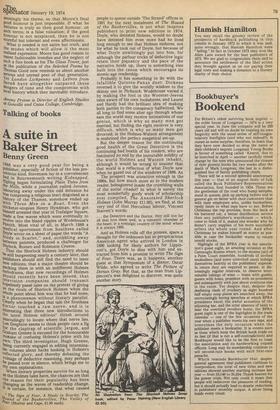Out of the shade
J.H. Prynne
London Lickpenny Peter Ackroyd (Ferry Press 60p) Letters from Sarah John James (Street Editions 90p) Spleen Nicholas Moore (Blacksuede Boot Press 50p) Selected Poems Thomas Good (St George's Press £3.50) Under the pleasant shade of a broad-leaved sycamore the young princes of Sidney's Arcadia recount to each other their "strange pilgrimage of passions" and within the mutuality of such exchange their figures of expression cunningly deflect emotion into artifice. It's not at all that passion disappears; rather that it disconnects from the personal focus, merging into lyrical irony, adoptive parody of theme, becoming more and more the collective invention of language. This ar Spectator January 19, 1974 cadian dispersal of tone, threatened almost to extinction in Shakespeare's Sonnets, makes a long perspective to some current problems of poetry in this time. For the history of an author's secret self-esteem is now always a-owding in, under cover of grim destiny or farcical neurotic crisis; like curry powder. disguising simple lack of control over the delicate middle registers of the language beyond our use of it.
And yet complete transparency of expression is a dangerous illusion since only in the Godhead are centre and circumference confounded. A man speaks from somewhere within his range of position and control and his echo is not his voice, though it is a part of what he makes of it. Candour is a finer thing than sincerity since it includes the whole art of the possible and is not prone to the set' tentious opposition of sense and nonsense. Peter Ackroyd's new book of poems is nicely candid in this way, very steady within the middle range of pastoral and passionate allusion. The surfaces are clean and direct, giving back the light of the reader's attention with clear rhythm and no excess. They are innocent in this deep sense, that despite an underflow of masking and counter-echo the show the painful links between language an', the human body without the intervention ol that bored and destructive heroism which j5 the worst violence of our age. Parody sen. timent and gentle pathos both cut glancinglY to the same bone, making not ironic reduction but refinement; as Sidney observed, divine part of man was not enclosed in th'' body for nothing." Of course refinement as a quality of lan; guage still shows a characteristic spectrum el tones; the writer gets into his cadence bY 8, light bleaching we might call reserve. Anodic' English poet's new book, Letters from Sarah by John James, goes for a sharper and more blood-stained pressure of language. ThAe sequence of sixteen poems is equally drainu of centralising authorial tone, indeed there is a synthetic cross-cutting bravura of transition which is the reckless conversation of an iffy possible maitre de toutes les circonstances. Little pieces of pastoralism, where "sheeP aspire/to your royal favour" are carried lilted passe eclogues or "mots vaporises," Migei between a tickled mirth and a forced pity. call this synthetic and its compress", authority is stunning. The power of earlie' work like a poem such as 'Equestrienne' in,.,hips book written with Andrew Crozier, In und" Side And Out the Other, has been transPos.
n to parodic density of the highest order. PP, ways in fun, the reader is twirlingly cut at bY
countless flying blades of language. tic vanity of these books, then, carry us past. vanity about personal resources for irorn`:, passion to which both Auden and Lowell hav` in our time been the most celebrated arl`: willing victims. Not that Ackroyd and Jaine. have advanced without precedent into t11.11; region; but the history of this development 11.5 poetry in England during the last fifteen Ye"to remains mostly unnoticed by the readers sigh in reassurance over Larkin's new Oxfo'"0 anthology. Yet annoyance about anything s‘t absurd, or "Dejection unable to rally/Agaill'r this dull conspiracy," can only deflect a writd, into just those tones he most needs to av°I,e Nicholas Moore's latest collection, a sequerl'is of 'translations' from Baudelaire's "Je comme le roi," takes parody to entail sat" e which is of course a deliberate excess of ton rather than the reverse.
He states the initial premise that "our et is one which particularly needs satire" and As in fact this must be a mistaken diagnosis. versions and subversions of Baudelair'he bored, resentful prince repositioned in tco garish environs of modern England have s, incidental persiflage which gets its wry r`re ponse from an alert reader. But his tones uney not really stubbornly independent at all; t'' re accommodate all the depravities which seemingly his theme, so that Moore's final good humour is just impossible. If what he imitates is truly so then good humour, on such terms, is a false valuation; if the good humour is not misplaced, then he is not scornful but tolerant and even affectionate.
What is needed is not satire but truth, and the modes which will allow it the most realised expression. Moore has good reason to resent fashionable trendies and the neglect of such a fine book as his The Glass Tower, just as the publication of the Selected Poems by Thomas Good now reminds us about another serious and unread poet of that generation. Yet London Lickpenny and Letters from Sarah have altogether outpaced these dangers of tone and the compromise with local history which they inevitably introduce.
Jeremy Piynne is Director of English Studies at Gonville and Caius College, Cambridge.



































 Previous page
Previous page